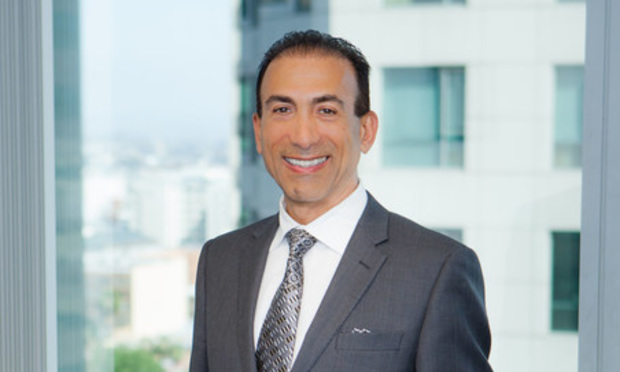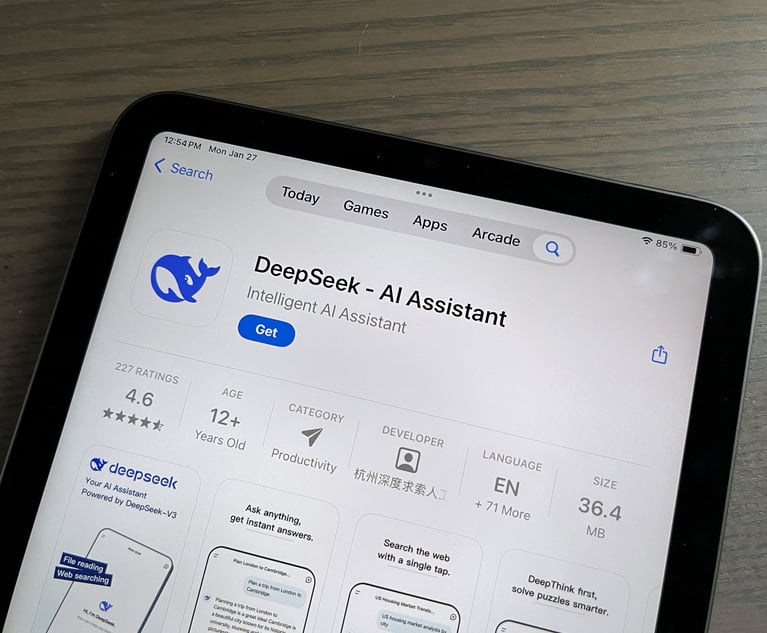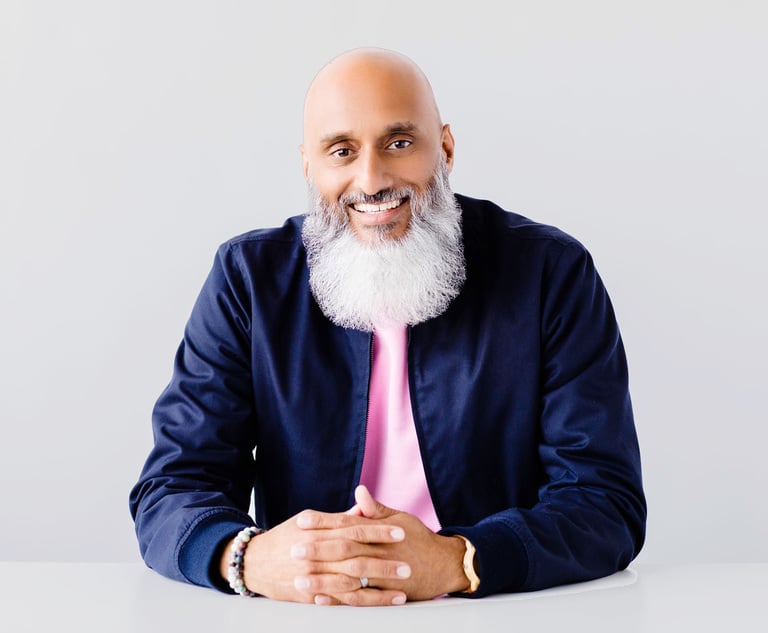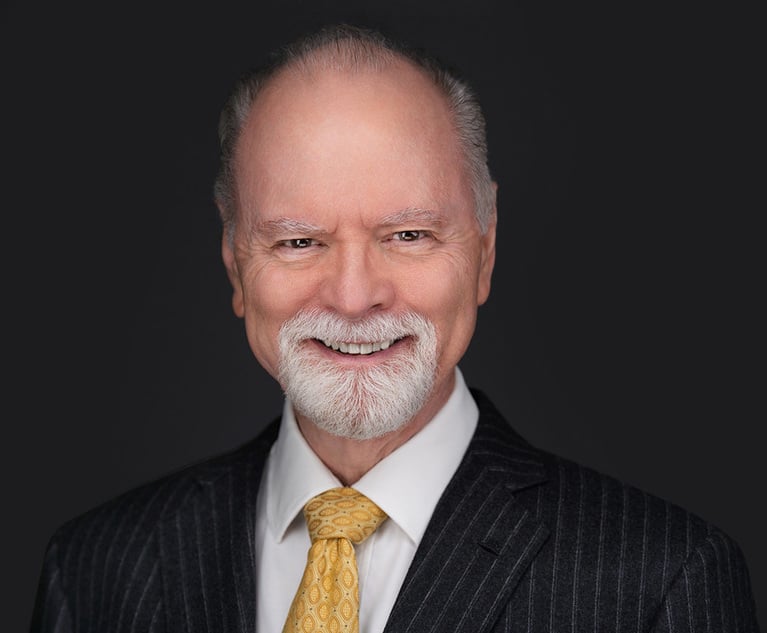The Music Modernization Act Revamps Music Licensing
Despite its critical significance, many of the Music Modernization Act's most consequential procedural rules and implementation details are yet to be determined and developed.
February 27, 2019 at 11:38 AM
8 minute read
 Dr. Dariush Adli, of ADLI Law Group. (Courtesy photo.)
Dr. Dariush Adli, of ADLI Law Group. (Courtesy photo.)
The Music Modernization Act (MMA), signed by the president last October, constitutes the most consequential change in music copyright law since 1976, affecting music licensing, protection for classic works and fairer distribution of royalties. The impetus behind MMA was the rise of the Internet in the 1990s and early 2000s, which, in turn, led to an evolution in the way users received music, away from physical copies to digital downloads and streaming.
Despite its critical significance, many of MMA's most consequential procedural rules and implementation details are yet to be determined and developed. MMA consists of three main parts (Titles): Music Licensing Modernization (Title I), Classics Protection and Access (Title II), and Allocation for Music Producers (Title III).
Title I of MMA modifies the mandatory “Mechanical License” provision of §115 of the U.S. Copyright Act, including how licenses are obtained, the royalty payment structure, and who carries the burden of identifying the copyright holders to the licensing system. Under the current, pre-MMA regime, licenses for reproduction and distribution of musical works, in digital format or phonorecords, are obtained on a per-work basis. MMA replaces this system for digital reproduction and distribution with a blanket license, which allows digital music providers to engage in downloads and interactive streaming without having to obtain the licenses individually.
Title II, another key provision of MMA, grants federal copyright protection to pre-1972 sound recordings. Under the previous system, public broadcasting of pre-Feb. 15, 1972, songs was not protected by federal copyright.
Finally, Title III of MMA provides for a more equitable distribution of royalties collected from digital streaming services by providing music producers, engineers and mixers with a share of those proceeds.
Music Licensing Modernization
A key aspect of MMA is its blanket licensing provision for digital streaming services, which replaces the current §115 license-per-work arrangement. A §115 Compulsory License allows a licensee to make and distribute, digitally or by phonorecords, musical works to the public for private use. MMA modifies that system by replacing the license-per-work with a new blanket licensing mechanism, which allows digital music providers to engage in downloads and interactive streaming with a single license. A single license will cover all songs streamed in the U.S., whether domestic or foreign in origin. There is no opt-out option.
MMA's new licensing arrangement is implemented through a soon to be established “Mechanical Licensing Collective” (MLC), an administrative body. Among other actions, the MLC will create a database of all the musical compositions, their owners and the percentage ownership, if applicable. Under this arrangement, prospective licensees of musical works will pay royalties to the MLC, and the MLC is required to transmit the payments received to songwriters. Under the current, pre-MMA, per-work licensing system, prospective licensees typically contact the rights owner(s) by sending a Notice of Intention to Use (NOI), which serves as official notice of an intent to make and distribute the work under §115's compulsory license provision. Contact information of the rights owner is routinely obtained from the public records of the Copyright Office. An NOI satisfies the notice requirement of §115 even if that address turns out to be incorrect. In cases where the rights owner's address is not available from the U.S. copyright records, the prospective licensee can satisfy its notice obligations by filing an “address unknown” NOI with the copyright office. MMA modifies this system by requiring rights owners to identify themselves to the MLC if they want to receive payment for use of their works.
The Mechanical License system is “compulsory,” meaning that a prospective licensee can obtain a license despite rights owners' wishes. Because the new system shifts the burden of identifying the composers from the licensees to the licensors, the license can be obtained regardless of whether composers take any action to make sure they are properly registered with the MLC. Therefore, it will be up to composers to get accurate ownership information to the Collective—in order to ensure receiving payment for use of their works.
Another important aspect of Title I is the compensation measure provided to rights holders. Under the previous system, composers received compensation for digital or physical copying of their works by service providers under rates set by statute. Under the new system, the statutory rate will be replaced with open market rate. In that regard, the MLC is tasked with determining the market rate for each musical work in its system.
Protection for Classic Songs
Under the pre-MMA system, public performance of pre-Feb. 15, 1972, sound recordings was not protected by federal copyright law. This issue dates back to 1971, when Congress first chose to grant copyright protection to artists' sound recordings. The law that passed, however, limited such recognition to sound recordings created after Feb. 15, 1972. In addition, the law enacted covered only rights of reproduction, distribution, and preparation of derivative works, not right of public performance. In 1995, Congress granted sound recording owners a limited public performance right for digital audio.
Under MMA, services providing digital streaming as well as satellite radio stations will be required to pay for public performance of pre-1972 songs. However, over the air radio stations, i.e., AM/FM radio, are not covered by this provision and thus can still play pre-1972 sound recordings without paying a royalty to the rights holders, other than composers.
Under Title II, the duration of the new public performance copyright in the sound recordings is quite long: 95 years after first publication of the recording, ending on December 31 of that year. For pre-1972 sound recordings, where recordings were first published before 1923, the additional time period ends on Dec. 31, 2021; for recordings first published between 1923 and 1946, the additional time period is 5 years after the general 95-year term; for recordings first published between 1947 and 1956, the additional time period is 15 years after the general 95-year term; and for all remaining recordings first fixed prior to Feb. 15, 1972, the additional transition period shall end on Feb. 15, 2067.
Safe Harbor Provision
Another provision of the MLM is a safe harbor for digital music providers during the transition period to full implementation of the MMA. This provision limits liability of prospective licensees for copyright infringement during the transition period, provided that they engage in good-faith efforts to identify and locate copyright owners of musical works they seek to license. The safe harbor provided dates back to Jan. 1, 2018, prior to the enactment of the MMA, thus potentially applying to infringements that occurred prior to the enactment of MMA.
Allocation for Music Producers
MMA seeks to achieve a fairer distribution of royalties to music creators by entitling contributing sound engineers, producers and mixers to a share of royalties received from digital performance services. This provision gives legal effect to a protocol in effect since 2004, where artists can direct royalty allocation payments to contributing studio professionals for sound recordings created after 1995, through sending a “Letter of Direction” to SoundExchange or any future distribution entity.
Further, MMA provides for royalty-based compensation to sound engineers, producers and mixers for sound recordings created before Nov. 1, 1995, by allowing them to solicit a letter of direction from the artist and receive a distribution of 2 percent of collected receipts from licensing transmissions of the sound recorded.
Conclusion
MMA represents a major revamping of U.S. copyright law as applied to musical works. However, it still should be considered a “work in progress” as administrative rules and implementation details are being worked out. Nevertheless, the act is a rare example of general consensus among groups that are most likely to be affected by the new law, including artists, publishers and digital service providers.
Dr. Dariush Adli, Ph.D., Esq., is the founder and president of ADLI Law Group. He is well recognized as a premier strategist in patent, trademark, copyright, trade secret and complex commercial disputes and is widely sought after by businesses large and small, seeking effective strategies for protecting their valuable intellectual property assets. He can be contacted at [email protected].
This content has been archived. It is available through our partners, LexisNexis® and Bloomberg Law.
To view this content, please continue to their sites.
Not a Lexis Subscriber?
Subscribe Now
Not a Bloomberg Law Subscriber?
Subscribe Now
NOT FOR REPRINT
© 2025 ALM Global, LLC, All Rights Reserved. Request academic re-use from www.copyright.com. All other uses, submit a request to [email protected]. For more information visit Asset & Logo Licensing.
You Might Like
View All
The Time Is Now for Employers to Assess Risk of Employees’ Use of DeepSeek
4 minute read
Loopholes, DNA Collection and Tech: Does Your Consent as a User of a Genealogy Website Override Another Person’s Fourth Amendment Right?

Trending Stories
- 1Conversation Catalyst: Transforming Professional Advancement Through Strategic Dialogue
- 2Trump Taps McKinsey CLO Pierre Gentin for Commerce Department GC
- 3Critical Mass With Law.com's Amanda Bronstad: 700+ Residents Near Ohio Derailment File New Suit, Is the FAA to Blame For Last Month's Air Disasters?
- 4Law Journal Column on Marital Residence Sales in Pending Divorces Puts 'Misplaced' Reliance on Two Cases
- 5A Message to the Community: Meeting the Moment in 2025
Who Got The Work
J. Brugh Lower of Gibbons has entered an appearance for industrial equipment supplier Devco Corporation in a pending trademark infringement lawsuit. The suit, accusing the defendant of selling knock-off Graco products, was filed Dec. 18 in New Jersey District Court by Rivkin Radler on behalf of Graco Inc. and Graco Minnesota. The case, assigned to U.S. District Judge Zahid N. Quraishi, is 3:24-cv-11294, Graco Inc. et al v. Devco Corporation.
Who Got The Work
Rebecca Maller-Stein and Kent A. Yalowitz of Arnold & Porter Kaye Scholer have entered their appearances for Hanaco Venture Capital and its executives, Lior Prosor and David Frankel, in a pending securities lawsuit. The action, filed on Dec. 24 in New York Southern District Court by Zell, Aron & Co. on behalf of Goldeneye Advisors, accuses the defendants of negligently and fraudulently managing the plaintiff's $1 million investment. The case, assigned to U.S. District Judge Vernon S. Broderick, is 1:24-cv-09918, Goldeneye Advisors, LLC v. Hanaco Venture Capital, Ltd. et al.
Who Got The Work
Attorneys from A&O Shearman has stepped in as defense counsel for Toronto-Dominion Bank and other defendants in a pending securities class action. The suit, filed Dec. 11 in New York Southern District Court by Bleichmar Fonti & Auld, accuses the defendants of concealing the bank's 'pervasive' deficiencies in regards to its compliance with the Bank Secrecy Act and the quality of its anti-money laundering controls. The case, assigned to U.S. District Judge Arun Subramanian, is 1:24-cv-09445, Gonzalez v. The Toronto-Dominion Bank et al.
Who Got The Work
Crown Castle International, a Pennsylvania company providing shared communications infrastructure, has turned to Luke D. Wolf of Gordon Rees Scully Mansukhani to fend off a pending breach-of-contract lawsuit. The court action, filed Nov. 25 in Michigan Eastern District Court by Hooper Hathaway PC on behalf of The Town Residences LLC, accuses Crown Castle of failing to transfer approximately $30,000 in utility payments from T-Mobile in breach of a roof-top lease and assignment agreement. The case, assigned to U.S. District Judge Susan K. Declercq, is 2:24-cv-13131, The Town Residences LLC v. T-Mobile US, Inc. et al.
Who Got The Work
Wilfred P. Coronato and Daniel M. Schwartz of McCarter & English have stepped in as defense counsel to Electrolux Home Products Inc. in a pending product liability lawsuit. The court action, filed Nov. 26 in New York Eastern District Court by Poulos Lopiccolo PC and Nagel Rice LLP on behalf of David Stern, alleges that the defendant's refrigerators’ drawers and shelving repeatedly break and fall apart within months after purchase. The case, assigned to U.S. District Judge Joan M. Azrack, is 2:24-cv-08204, Stern v. Electrolux Home Products, Inc.
Featured Firms
Law Offices of Gary Martin Hays & Associates, P.C.
(470) 294-1674
Law Offices of Mark E. Salomone
(857) 444-6468
Smith & Hassler
(713) 739-1250







